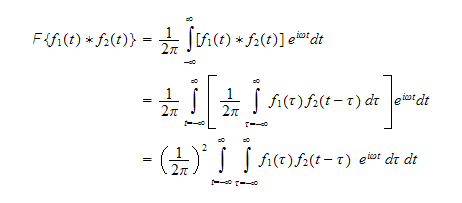
Problem #4
UCI. MAE200B, winter 2006. by nasser Abbasi.
Problem: Prove the convolution theorem for the Fourier
transform

Solution
Some definitions first. The Fourier transform is defined as (using textbook definition)

and the inverse fourier transform is

And the convolution is defined as

Start the proof by showing that
 ,
this implies that
,
this implies that

So, take the fourier transform of the convolution, we obtain

Let
 ,
hence
,
hence
 ,
and so
,
and so
 .
When
.
When
 ,
,
 and the above can be written as
and the above can be written as

Exchange the integrals order we obtain

Break the exponential into product of 2 exponential

We can now move the marked terms outside the inner integral since they do not
depend on


But by definition
 and similarly
and similarly
 ,
hence eq (1) can be written as
,
hence eq (1) can be written as

This results means that

This completes the proof. (We should also proof the other direction since this
is an IFF problem, i.e. starting from
 take its inverse fourier transform we would get the convolution). But I think
this proof done here should be sufficient.
take its inverse fourier transform we would get the convolution). But I think
this proof done here should be sufficient.